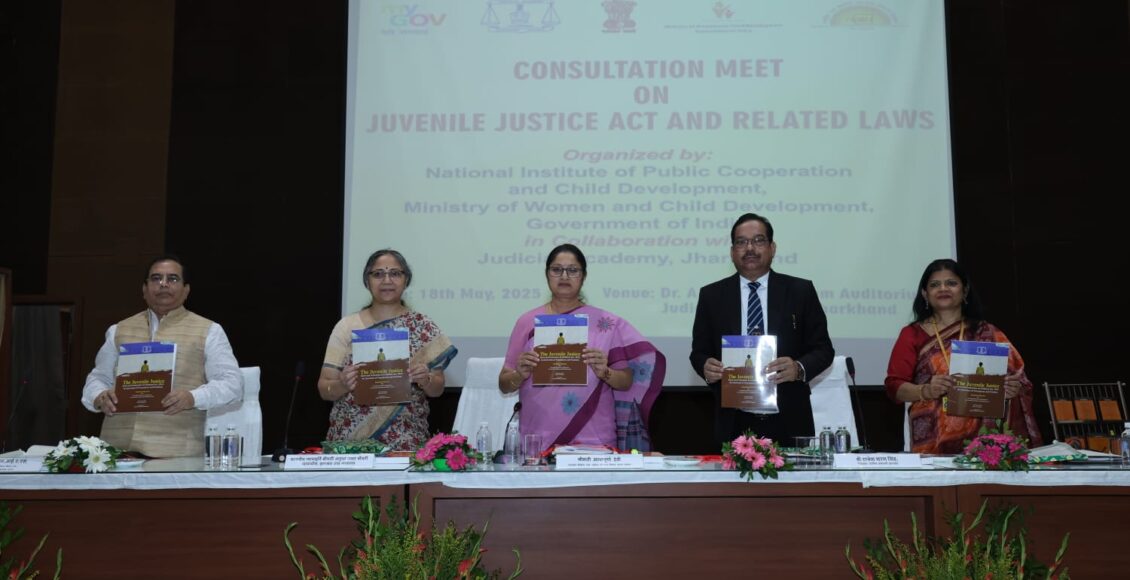Ranchi: A comprehensive conference-cum-consultation meet on juvenile justice and related laws was organized by the National Institute of Public Cooperation and Child Development, Ministry of Women and Child Development, Government of India in collaboration with the Judicial Academy, Jharkhand.
The conference was graced by the chief guest, Union Cabinet Minister for Women and Child Development Annapurna Devi, and special guest Jharkhand High Court Judge Justice Anubha Rawat Choudhary.
The event commenced with the presentation of bouquets, shawls, and mementos to the dignitaries, followed by a welcome address by Shri Rajesh Sharan Singh, Director, Judicial Academy, Jharkhand.
Annapurna Devi shed light on the social circumstances that often lead children into conflict with the law. Applauding the JJ Act for its rehabilitative framework, she highlighted various government initiatives focused on providing education and healthcare to vulnerable children. She also announced the upcoming establishment of a regional NIPCCD centre in Jharkhand, in collaboration with the state government, to further strengthen child welfare infrastructure in the region.
It was followed by an inaugural speech delivered by Justice Choudhary, wherein she commended the organizers for their foresight in convening such a comprehensive conference. She expressed appreciation for the diversity of technical sessions and reiterated that juvenile justice must always be restorative, not retributive.
Building on this, Women, Child Development & Social Security Department secretary Manoj Kumar highlighted the pivotal roles of DCPOs, CDPOs, and Child Helpline units in effectively implementing the JJ Act and Mission Vatsalya at the grassroots level.
It was followed by a keynote address delivered by Dr. Sanghmitra Barik, Joint Director, NIPCCD, New Delhi, emphasizing the significance of Mission Vatsalya, a flagship initiative of the central government aimed at ensuring the holistic care and protection of children. She stressed the crucial role of all stakeholders in ensuring that no child is left behind due to procedural or technical lapses.
A book published by the Judicial Academy, Jharkhand, was released by the dignitaries, followed by the Vote of Thanks by Shri Satyakam Priyadarshi, Senior Faculty, Judicial Academy.
The first technical session was conducted by Abhay Nandan Ambastha, IAS, Additional Secretary, Women and Child Development, Jharkhand, who outlined state initiatives and shared data on Child Care Institutions. The second session was led by Smt. Vandana Singh, Advocate, High Court of Jharkhand. She addressed the impact of the new criminal laws on the juvenile justice system, discussed parental liability under the Motor Vehicle Act, juvenile involvement in cybercrime, and the functioning of children’s courts.
The final session was conducted jointly by Dr. Sanghmitra Barik and Mr. Junaid-ul-Islam, Senior Advisor, Ministry of Women and Child Development. They provided an overview of the POCSO Act, 2012, and highlighted special initiatives like BHAROSA (Telangana Govt.) and NIRBHEEK (Delhi Police), along with a detailed explanation of Mission Vatsalya.
Justice S. Ravindra Bhat, Judge, Supreme Court of India (Retd.), in the fourth technical session, emphasized the foundational principles of the Juvenile Justice Act. He stated, “Children are a gift to the future, which we cannot yet see,” highlighting the importance of child-centric and constitutionally aligned justice. He underscored the JJB’s duty to ensure time-bound, child-friendly inquiries focused on rehabilitation, not retribution. Justice Bhat also stressed the need for proper reintegration of juveniles into society post-release.
The final session was conducted by Shri Chand Kiran Choker, Joint Director, NIC, Ministry of Women and Child Development, who provided a detailed demonstration of the Mission Vatsalya Portal and elaborated on the crucial role of stakeholders in ensuring real-time coordination and accountability. The conference concluded with valedictory remarks by Shri Apurba Saha, Assistant Director, NIPCCD, who reflected on the key takeaways and expressed gratitude to all participants and dignitaries.

